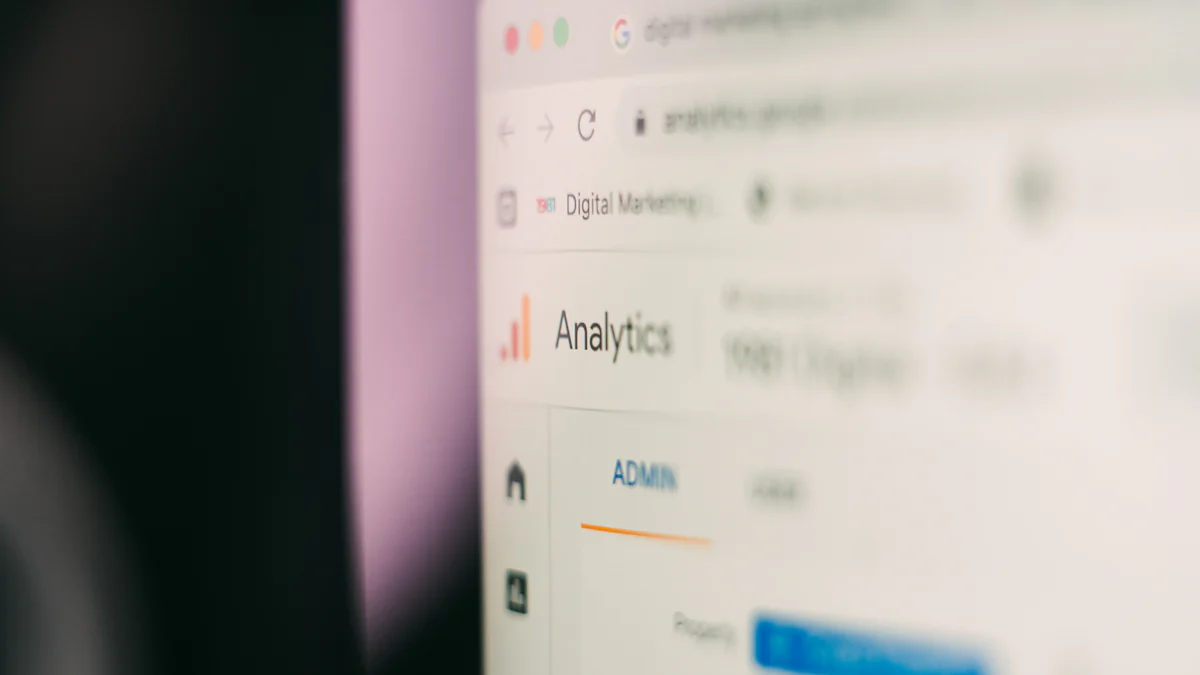
Search Engine Optimization (SEO) helps you improve your website’s visibility on search engines like Google. It ensures your content appears when users search for relevant topics. In 2025, SEO plays a vital role in digital success. It helps you attract more visitors, build trust with your audience, and grow your business. By optimizing your site, you create a better experience for users and increase your chances of standing out in a competitive online world.
Create Site Now
Get a High-Converting Landing Page in Just One Minute
Key Takeaways
SEO helps your website show up on search engines. This makes it easier for people to find your content. Work on improving your site to get more visitors.
Gaining trust and being reliable is very important. Good content and links from trusted sites make you look dependable to users.
A good user experience keeps visitors interested. Make sure your site loads fast, is simple to use, and works well on phones to make users happy.
Use a strong SEO plan with on-page, off-page, and technical methods. This helps your business grow over time and stay ahead of others.
Keep learning about new SEO trends and tools. Change your plans often to match what users and search engines want.
What is SEO?
Definition and Purpose
SEO stands for Search Engine Optimization. It involves improving your website to make it more visible on search engines like Google. When users search for specific topics, SEO ensures your content appears among the top results. The primary goal is to connect your website with the right audience. By optimizing your site, you help search engines understand your content better. This process increases your chances of attracting visitors who are genuinely interested in what you offer.
How Search Engines Rank Content
Search engines use algorithms to decide which content appears first. These algorithms analyze several factors, including relevance, quality, and user experience. For example, they check if your content matches the search query and if your website loads quickly. They also consider how long users stay on your page and whether they interact with your content. To rank higher, you need to focus on creating valuable content and ensuring your site performs well.
Tip: Regularly updating your website with fresh, high-quality content can improve your rankings.
The Evolution of SEO in 2025
SEO has changed significantly over the years. In 2025, it focuses more on user intent and advanced technologies. Search engines now prioritize content that answers specific questions or solves problems. Artificial intelligence plays a bigger role in analyzing user behavior and delivering personalized results. Mobile-first indexing has become essential, as most users browse on their phones. To succeed, you need to adapt to these changes and stay updated with the latest trends.
Why SEO is Important in 2025

Boosting Online Visibility
Your website’s visibility determines how easily users can find you online. SEO helps you rank higher on search engine results pages (SERPs), making your content more accessible to your target audience. When your site appears on the first page of search results, users are more likely to click on it. This increased visibility drives more traffic to your website, giving you a competitive edge.
To boost visibility, focus on optimizing your content with relevant keywords and ensuring your site is mobile-friendly. Search engines prioritize websites that provide value and perform well. By improving these aspects, you can attract more visitors and grow your online presence.
Tip: Use tools like Google Analytics to track your website’s performance and identify areas for improvement.
Building Trust and Credibility
Users trust websites that appear at the top of search results. SEO helps you build this trust by improving your site’s authority and relevance. When your content consistently provides accurate and helpful information, users see you as a reliable source.
Backlinks from reputable websites also enhance your credibility. These links act as endorsements, signaling to search engines that your content is valuable. By focusing on quality over quantity, you can establish a strong online reputation.
Note: Regularly updating your content ensures it remains accurate and relevant, further boosting your credibility.
Enhancing User Experience
A positive user experience keeps visitors on your site longer and encourages them to return. SEO plays a key role in improving this experience. Fast-loading pages, easy navigation, and mobile-friendly designs make your site more enjoyable to use.
Search engines reward websites that prioritize user satisfaction. By optimizing your site’s structure and content, you not only improve your rankings but also create a better experience for your audience.
Emoji Tip: 🚀 Speed up your website to keep users engaged and reduce bounce rates.
Supporting Long-Term Business Growth
SEO plays a crucial role in ensuring your business thrives over time. By optimizing your website, you create a foundation for sustainable growth. Unlike short-term marketing tactics, SEO delivers consistent results that help you stay ahead of competitors.
One of the key benefits of SEO is its ability to attract organic traffic. When your website ranks higher on search engines, you gain visitors who are genuinely interested in your products or services. This steady flow of traffic increases your chances of converting leads into loyal customers.
Tip: Focus on creating evergreen content that remains relevant for years. This strategy ensures your website continues to attract visitors without constant updates.
SEO also helps you adapt to changing market trends. Search engines evolve, and so do user behaviors. By staying updated with SEO best practices, you can adjust your strategies to meet new demands. This flexibility keeps your business competitive in a dynamic digital landscape.
Additionally, SEO supports brand recognition. When users repeatedly see your website in search results, they become familiar with your brand. Over time, this familiarity builds trust and encourages them to choose your business over others.
To achieve long-term success, invest in a comprehensive SEO strategy. Combine on-page, off-page, and technical SEO techniques to strengthen your online presence. By doing so, you ensure your business remains visible, credible, and profitable for years to come.
Key Components of SEO in 2025
On-Page SEO
Content Optimization
Content optimization ensures your website delivers value to users and aligns with search engine requirements. You should focus on creating high-quality, relevant, and engaging content. Use headers, bullet points, and visuals to make your content easy to read. Search engines reward content that answers user queries effectively. Regularly updating your content keeps it fresh and improves its performance.
Tip: Use tools like Grammarly or Hemingway to refine your writing and improve readability.
Keyword Research
Keyword research helps you understand what your audience is searching for. By identifying the right keywords, you can create content that matches user intent. Use tools like Google Keyword Planner or SEMrush to find relevant keywords. Focus on long-tail keywords, as they often have less competition and higher conversion rates.
Off-Page SEO
Link Building Strategies
Link building involves earning backlinks from reputable websites. These links act as endorsements, signaling to search engines that your content is valuable. To build quality links, you can collaborate with industry influencers, create shareable content, or write guest posts. Avoid spammy practices, as they can harm your rankings.
Social Media Signals
Social media platforms play a significant role in off-page SEO. Sharing your content on social media increases its visibility and encourages others to link to it. Engaging with your audience on platforms like Twitter or LinkedIn also boosts your online presence.
Technical SEO
Website Speed Optimization
A fast-loading website improves user experience and helps you rank higher. Compress images, use caching, and minimize code to enhance your site’s speed. Tools like Google PageSpeed Insights can help you identify areas for improvement.
Mobile-First Indexing
Most users browse the internet on mobile devices. Mobile-first indexing means search engines prioritize the mobile version of your site. Ensure your website is responsive and provides a seamless experience on all devices.
Local SEO
Google Business Profile
Your Google Business Profile (GBP) is a powerful tool for improving local SEO. It helps your business appear in local search results and on Google Maps. By optimizing your profile, you make it easier for potential customers to find you. Start by claiming your profile if you haven’t already. Then, ensure all the information is accurate and up-to-date. This includes your business name, address, phone number, and website link.
Adding high-quality photos of your business can also make a big difference. Pictures of your storefront, products, or services help users connect with your brand. Don’t forget to include your business hours and any special services you offer.
Tip: Regularly update your Google Business Profile with posts about promotions, events, or new products. This keeps your profile active and engaging.
Encourage customers to leave reviews on your profile. Positive reviews not only build trust but also improve your local rankings. Responding to reviews, whether positive or negative, shows that you value customer feedback.
Local Reviews and Keywords
Local reviews play a crucial role in building your online reputation. When customers share their experiences, they help others decide whether to choose your business. Encourage satisfied customers to leave reviews on platforms like Google, Yelp, or Facebook. Make the process simple by providing direct links or QR codes.
Using local keywords in your content and reviews can further boost your visibility. For example, if you run a bakery in Chicago, include phrases like “best bakery in Chicago” or “Chicago cupcakes.” These keywords help search engines connect your business with local searches.
Emoji Tip: 📍 Add location-specific keywords to your website and social media posts to attract nearby customers.
By focusing on local reviews and keywords, you strengthen your local SEO strategy. This ensures your business stands out in your community and attracts more customers.
SEO Strategies for 2025

Advanced Keyword Research Techniques
Keyword research has become more sophisticated in 2025. To stay ahead, you need to focus on understanding user intent. Instead of targeting broad terms, prioritize long-tail keywords. These phrases often reflect specific queries and attract users who are ready to take action.
Use tools like SEMrush or Ahrefs to analyze search trends. These platforms help you identify keywords with high potential. Pay attention to voice search queries as well. Many users now rely on voice assistants, so optimizing for conversational phrases can give you an edge.
Tip: Create a list of questions your audience might ask. Then, craft content that answers these questions directly.
Creating AI-Enhanced Content
Artificial intelligence (AI) has revolutionized content creation. You can now use AI tools to generate ideas, write drafts, and even optimize your content for search engines. These tools analyze data to predict what your audience wants to read.
For example, platforms like ChatGPT or Jasper can help you create engaging articles. They suggest headlines, improve readability, and ensure your content aligns with SEO best practices. However, always review AI-generated content to maintain accuracy and authenticity.
Emoji Tip: 🤖 Use AI to save time, but add your personal touch to connect with your audience.
Building High-Quality Backlinks
Backlinks remain a cornerstone of SEO in 2025. Focus on earning links from authoritative websites. Quality matters more than quantity. To achieve this, create content that others want to share. Infographics, case studies, and in-depth guides often attract backlinks.
You can also collaborate with industry experts. Guest blogging on reputable sites introduces your content to a broader audience. Avoid spammy link-building tactics, as they can harm your rankings.
Note: Building relationships with other website owners can lead to natural backlink opportunities.
Leveraging AI and Automation Tools
AI and automation tools have transformed how you approach SEO in 2025. These tools save time and improve efficiency by handling repetitive tasks and providing valuable insights. By using them, you can focus on creating strategies that drive results.
AI-powered platforms like Surfer SEO or MarketMuse analyze your content and suggest improvements. They help you identify gaps, optimize for keywords, and ensure your content aligns with user intent. Automation tools like Zapier streamline workflows by connecting different apps. For example, you can automate tasks like posting updates or tracking analytics.
Tip: Use AI tools to analyze competitors’ strategies and uncover opportunities for growth.
Voice search optimization is another area where AI shines. Tools like AnswerThePublic help you discover questions your audience asks. You can then create content that directly addresses these queries. AI chatbots also enhance user experience by providing instant responses to visitors.
To get the most out of these tools, start small. Test a few platforms and measure their impact. Gradually integrate them into your workflow to maximize efficiency.
Emoji Tip: 🤖 Let AI handle the heavy lifting so you can focus on creativity and strategy.
Staying Updated with SEO Trends
SEO evolves rapidly, and staying updated is essential for success. Search engines frequently update algorithms, which can impact your rankings. By keeping up with trends, you ensure your strategies remain effective.
Follow trusted SEO blogs like Moz or Search Engine Journal. These platforms provide insights into the latest updates and best practices. Attend webinars or conferences to learn from industry experts. Networking with professionals also helps you stay informed.
Note: Subscribe to newsletters from SEO tools like Ahrefs or SEMrush for regular updates.
Experimentation is key. Test new strategies and monitor their performance. Use analytics tools to track changes and adjust your approach. Staying proactive helps you adapt to shifts in user behavior and technology.
Emoji Tip: 📈 Treat SEO as a journey of continuous learning and improvement.
SEO remains a cornerstone of digital success in 2025. By implementing the strategies outlined in this blog, you can improve your website’s visibility, build trust with your audience, and drive sustainable growth. Focus on creating high-quality content, optimizing your site, and staying informed about emerging trends. Adapting to changes in technology and user behavior ensures your business stays competitive. Start applying these techniques today to secure your place in the evolving digital landscape.
FAQ
What is the difference between on-page and off-page SEO?
On-page SEO focuses on optimizing elements within your website, like content and keywords. Off-page SEO involves activities outside your site, such as building backlinks and engaging on social media. Both work together to improve your rankings.
Tip: Balance both strategies for the best results.
How long does it take to see SEO results?
SEO is a long-term strategy. You may notice improvements in 3-6 months, depending on your efforts and competition. Consistency and regular updates help speed up progress.
Emoji Tip: ⏳ Patience pays off in SEO!
Can AI tools replace manual SEO efforts?
AI tools can assist with tasks like keyword research and content optimization. However, they cannot replace human creativity and strategy. Use them to save time, but always review and refine their output.
Is mobile optimization still important in 2025?
Yes, mobile optimization remains critical. Most users browse on mobile devices, and search engines prioritize mobile-friendly websites. Ensure your site loads quickly and adapts to different screen sizes.
Note: Test your site on multiple devices to ensure a seamless experience.
Do backlinks still matter for SEO?
Backlinks remain essential for SEO. They signal to search engines that your content is valuable. Focus on earning links from reputable sources to boost your authority and rankings.
Tip: Create shareable content like infographics or guides to attract backlinks naturally.








